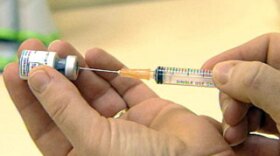According to the Centers for Disease Control and Prevention, more than 300,000 doses of the vaccination against Covid-19 have been shipped to North Carolina. The CDC reports 94,865 people have received the first of two doses of the shot as of Jan. 2, though that data can lag by a few days.
The first doses went to those in healthcare who work directly with Covid-19 patients. Late last week, NC Health Secretary Dr. Mandy Cohen laid out plans for who is next in line to receive the shots.
"Vaccines will be available to everyone," she said. "But currently, supplies are limited and will continue to be limited for the next few months."
Health workers in direct contact with Covid-19 patients constituted Phase 1a. Phase 1b covers many more people, and is broken down into three subgroups. Cohen said the state could move in to Phase 1b by the middle of January. See the full rollout phases below.
"The first phases focus on protecting health care workers caring for patients with COVID-19, protecting people who are at the highest risk of being hospitalized or dying, and protecting those at highest risk of exposure to COVID-19," Cohen said.
Importantly, Cohen and Gov. Roy Cooper said they want to make sure vaccines are administered equitably. Cohen acknowledged long-standing disparities in health care and that the state will have to prepare to not repeat those inequities.
"The early data suggests that there is still work to be done to be sure that vaccines are administered, equitably," Cohen said.
In late December, DHHS announced a partnership with North Carolina Central University’s Advanced Center for COVID-19 Related Disparities "to ensure comprehensive COVID-19 information is effective in reaching underserved communities in North Carolina," according to a DHHS news release. N.C. Central is the first state-supported liberal arts college for African American students in North Carolina.
The full rollout will take place in four phases, some with subgroups. Here is a full breakdown:
Phase 1a: Health care workers fighting COVID-19 & Long-Term Care staff and residents
Phase 1b: Adults 75 years or older and frontline essential workers
- Group 1: Anyone 75 years or older, regardless of health status or living situation
- Group 2: Health care workers and frontline essential workers 50 years or older. The CDC defines frontline essential workers as first responders (e.g., firefighters and police officers), corrections officers, food and agricultural workers, U.S. Postal Service workers, manufacturing workers, grocery store workers, public transit workers, and those who work in the education sector (teachers and support staff members) as well as child care workers.
- Group 3: Health care workers and frontline essential workers of any age
Phase 2: Adults at high risk for exposure and at increased risk of severe illness
- Group 1: Anyone 65-74 years old, regardless of health status or living situation
- Group 2: Anyone 16-64 years old with high-risk medical conditions that increase risk of severe disease from COVID such as cancer, COPD, serious heart conditions, sickle cell disease, Type 2 diabetes, among others, regardless of living situation
- Group 3: Anyone who is incarcerated or living in other close group living settings who is not already vaccinated due to age, medical condition or job function
- Group 4: Essential workers not yet vaccinated. The CDC defines these as workers in transportation and logistics, water and wastewater, food service, shelter and housing (e.g., construction), finance (e.g., bank tellers), information technology and communications, energy, legal, media, and public safety (e.g., engineers), and public health workers.
Phase 3: Students
- College and university students
- K-12 students age 16 and over. Younger children will only be vaccinated when the vaccine is approved for them.
Phase 4: Everyone who wants a safe and effective COVID-19 vaccination









